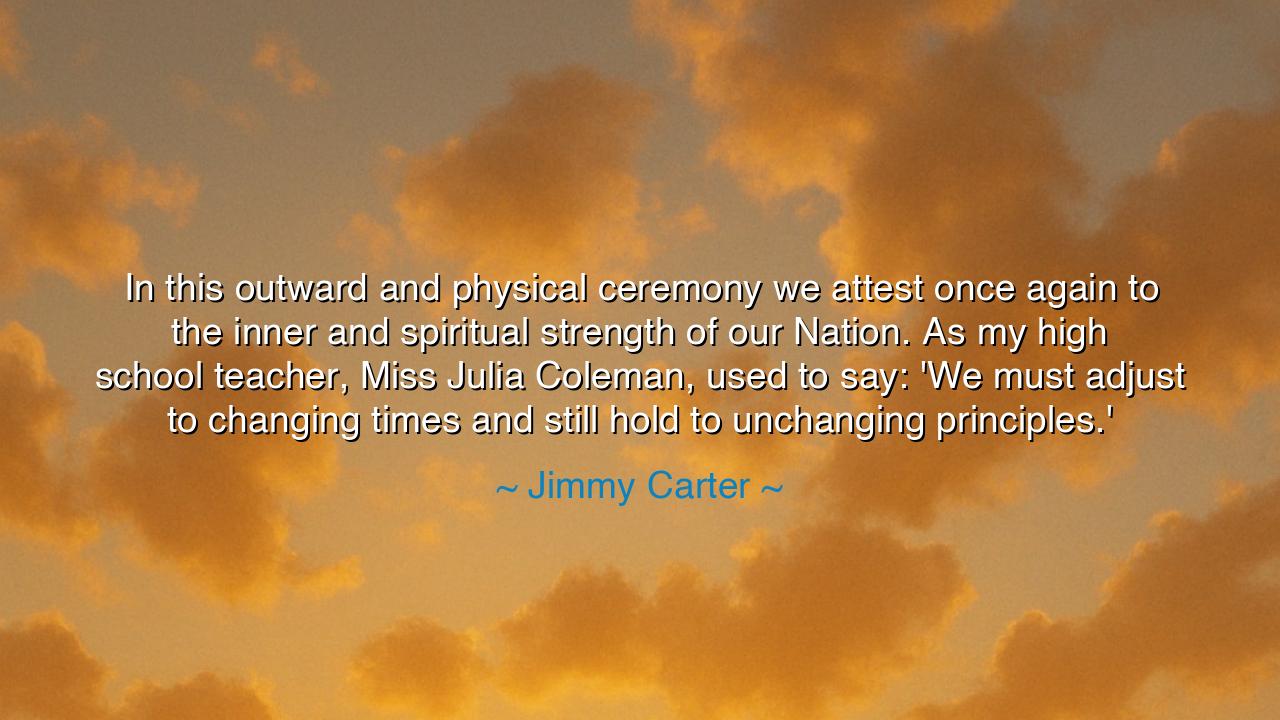
In this outward and physical ceremony we attest once again to the
In this outward and physical ceremony we attest once again to the inner and spiritual strength of our Nation. As my high school teacher, Miss Julia Coleman, used to say: 'We must adjust to changing times and still hold to unchanging principles.'






Hearken, children of virtue and wisdom, and listen to the words of Jimmy Carter, who proclaimed: "In this outward and physical ceremony we attest once again to the inner and spiritual strength of our Nation. As my high school teacher, Miss Julia Coleman, used to say: 'We must adjust to changing times and still hold to unchanging principles.'" In this declaration lies the timeless truth of balance between external action and internal conviction, between the fleeting pageantry of ritual and the enduring power of principle and moral courage.
The origin of Carter’s reflection springs from both personal experience and civic duty. Raised in the quiet fields of Plains, Georgia, he absorbed the teachings of Miss Julia Coleman, whose lessons were not merely academic, but ethical, shaping the young mind to recognize the tension between change and constancy. It is within this crucible of guidance that Carter learned that ceremonies—be they graduations, inaugurations, or solemn oaths—are more than tradition; they are manifestations of deeper truths, testaments to character, resolve, and shared values.
To understand this, consider the nature of ceremony itself. The outward motions—the robes, the pledges, the assembled witness—are but vessels, carrying the weight of the spiritual and moral foundation beneath. Just as a temple stands not for bricks alone but for the devotion they house, so too do public ceremonies declare the strength of a people, the unity of their ideals, and the integrity of their nation’s soul. Carter reminds us that the external is inseparable from the internal; one attests the other.
The wisdom of Miss Julia Coleman—“We must adjust to changing times and still hold to unchanging principles”—is as old as the ages. Societies have always faced the challenge of adapting without abandoning core values. Consider Solon of Athens, who reformed laws to meet the needs of a changing polis while preserving justice and equity as guiding lights. Or think of Abraham Lincoln, who navigated the perilous currents of civil war with policies ever responsive to circumstance, yet grounded firmly in the principle that all men are created equal. These examples echo Carter’s lesson: wisdom is the harmony of flexibility and fidelity.
The teaching is deeply emotional because it speaks to the heart of human responsibility. Change is inevitable—storms will rise, customs will shift, generations will inherit a world unfamiliar. Yet in the midst of uncertainty, the human spirit, the ethical compass, must remain steadfast. Ceremonies remind us, and the words of mentors instruct us, that strength is measured not only in action but in adherence to enduring truths. Without principles, adaptation is chaos; without adaptation, principles risk irrelevance.
History offers many stories of those who embodied this wisdom. Queen Elizabeth I ruled a realm threatened by religious conflict, political intrigue, and foreign pressure. She adjusted her policies to meet the evolving landscape of Europe, yet remained unwavering in her vision of an England united under tolerance, justice, and strength. Similarly, Carter’s reflection calls upon all citizens to recognize that leadership and virtue require both pragmatism and steadfastness, a dance between responsiveness and fidelity.
The lesson is luminous: we are called to navigate the currents of change without surrendering our moral anchors. Ceremony, ritual, and outward recognition are valuable, but only insofar as they reflect the integrity of the spirit and the principles we uphold. Carter teaches that true strength—of self, of community, of nation—is found in the courage to adjust wisely while remaining loyal to what is eternal, just, and true.
Practical actions arise from this wisdom: honor traditions that reflect core values; cultivate awareness of the changing world; practice discernment in decision-making, ensuring flexibility does not erode ethics; seek mentors and guides whose wisdom balances innovation with principle; and above all, align action with conscience, letting the inner strength of character govern the outward forms of life. In doing so, one embodies the eternal harmony between change and constancy, as Carter and his teacher wisely instruct.
If you wish, I can craft an even more epic, oratory version of this, giving Carter’s words a mythic, heroic rhythm, perfect for immersive audio narration. Do you want me to do that?






AAdministratorAdministrator
Welcome, honored guests. Please leave a comment, we will respond soon